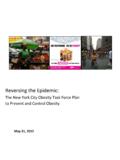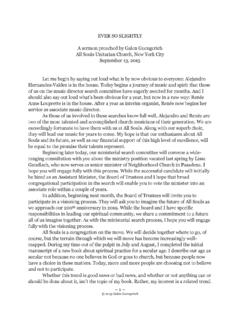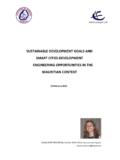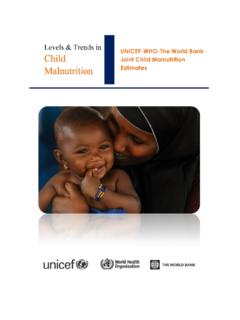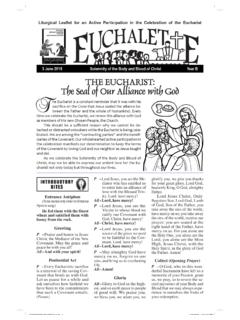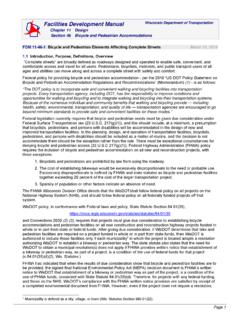Transcription of Ideological Views in Emerging Adulthood: Balancing ...
1 Journal of Adult Development, Vol. 8, No. 2, 2001 Ideological Views in Emerging Adulthood: BalancingAutonomy and CommunityJeffrey Jensen Arnett,1,4 Kathleen D. Ramos,2and Lene Arnett Jensen3 Ideological Views of 140 Emerging adults (ages 20 29) were explored, using the ethics ofAutonomy, Community, and Divinity. Two questions were asked as part of an interview: When you get toward the end of your life, what would you like to be able to say aboutyour life, looking back on it? and What values or beliefs do you think are the mostimportant to pass on to the next generation? Overall, Emerging adults used Autonomy andCommunity in roughly equal proportions, whereas Divinity was used relatively of Autonomy was negatively correlated with use of Community on both questions, butthe correlations were modest, and some Emerging adults were able to reconcile the twoethics.
2 Qualitative examples are presented to illustrate the findings of the study, and thefindings are discussed in the context of claims about American WORDS:Individualism; collectivism; community; identity; young recent decades, a distinct period of the lifecourse has opened up in American society extendingfrom the late teens to the mid-to-late twenties. Asrecently as 1960, the median marriage age was about20 for women and 22 for men; by 1997, it had risento 25 for women and 27 for men, a remarkable shiftover a period of less than forty years ( Bureauof the Census, 1998). Similar shifts have taken placein other areas toward a higher median age of firstchildbirth, a higher proportion of young people at-tending higher education after high school, and ahigher proportion of those with undergraduate de-grees pursuing postgraduate education (Arnett,2000).
3 The overall result of these changes is that itis no longer normative for the late teens and earlytwenties to be a period of intensive preparation forimminent entry into adult roles. On the contrary, thenew norm is that these are years of experimentationand exploration of a variety of life possibilities, asenduring decisions are delayed for many young peo-1 University of of University of correspondence to Jeffrey Jensen Arnett, Department ofHuman Development, 3304 Benjamin Building, College Park,MD 20742. e-mail: 2001 Plenum Publishing Corporationple into the mid-to-late twenties. As it has developedin recent decades, this period has been referred toby a variety of terms, most recently asemerging adult-hood(Arnett, 1998, 2000).
4 Experimentation and exploration are a key partof Emerging adulthood, in love and work and alsowith respect to developing an ideology or (1950, 1968) was the first theorist to observethis. He considered developing an ideology to be anessential part of identity development, along withmaking explorations and choices in love and work. An Ideological system, he stated, is a coherentbody of shared images, ideas, and ideals [that] pro-vides for the participant a coherent, if systematicallysimplified, over-all orientation in space and time, inmeans and ends (Erikson, 1968, pp. 189 90). Fur-thermore, although he specified adolescence as thetime when issues of identity were at the forefront,he also recognized that many industrialized societieswere beginning to allow an extendedpsychosocialmoratoriumbeyond adolescence during which theidentity explorations of adolescence continued andeven intensified, with respect to love, work, and ideol-ogy (Erikson, 1968).
5 Similarly, Keniston (1971) em-phasized Ideological development as central to thelate teens early twenties period he termed youth. 70 Arnett, Ramos, and JensenHis primary focus was on the Ideological explorationsof young people as they confronted the explosivesocial issues of the late 1960 s and early 1970 s in theUnited studies have indicated the importance ofideology as a focus of development for the currentgeneration of Emerging adults. Forming an ideologyinvolves making judgments about beliefs and values,and several studies have shown that to decide onone s own beliefs and values is a crucial part ofbecoming an adult (Arnett, 1997, 1998; Greene,Wheatley, & Aldava, 1992; Scheer, Unger, & Brown,1994).
6 Studies also indicate that a majority of youngpeople in American society do not consider them-selves to have become fully adult until they reachtheir late twenties (Arnett, 1997, 2001). This suggeststhat, for many young people, deciding on their ownbeliefs and values developing an ideology is aprocess that is continuing during their late teens andtwenties (see Arnett, 2001). In fact, it is qualities suchas deciding on their own beliefs and values, and notrole transitions such as marriage or finishing educa-tion, that are most important to Emerging adults inmarking their transition to adulthood (Arnett,1997, 2001).One way to examine Ideological thinking duringemerging adulthood is in terms of Shweder s ethics ofAutonomy, Community, and Divinity (Jensen, 1995,1997a, 1997b; Shweder, Much, Mahapatra, & Park,1997).
7 These three ethics have been proposed as aconception of the ways that people of diverse agesin diverse cultures may structure their beliefs, values,and moral Views . The ethic of Autonomy defines theindividual as the primary moral authority, un-restricted in choices except by his or her own prefer-ences. Beliefs and values in this ethic center on indi-vidual rights, especially the belief that individualsshould be free to do as they like so long as theirbehavior does no direct harm to others. In contrast,the ethic of Community defines individuals as mem-bers of groups to which they have commitments andobligations. The responsibilities of roles in the family,the community, and other groups are the basis ofone s beliefs and values.
8 The ethic of Divinity definesthe individual as a spiritual entity, subject to the pre-scriptions of a spiritual or natural order. An ethic ofDivinity includes beliefs and values based on tradi-tional religious authorities and sometimes on reli-gious texts ( , the Bible, the Koran).Several studies have shown the usefulness of thisapproach for describing the moral and ideologicalviews of young people in their late teens and (1995) found that young people aged 19 24relied strongly on the ethic of Autonomy in ex-plaining their moral Views , whereas they invoked theethic of Community less often, and the ethic of Divin-ity very little. In contrast, midlife and older adultsused the three ethics about equally.
9 Similarly, Haidt,Koller, and Dias (1993) examined the Views of emerg-ing adults living in an American city and two Brazil-ian cities with respect to a variety of moral found that college students in both countriesmade frequent use of the ethic of Autonomy andwere less likely to use the ethics of Community orDivinity. However, they also found that noncollegeemerging adults of lower socioeconomic status (SES)backgrounds used Community more than Autonomyin both findings that the ideologies of emergingadults in the United States are strongly based in Au-tonomy can be explained by two factors, one culturaland one developmental. Culturally, it has often beennoted that American society is highly individualistic,especially in the higher social classes ( , Alwin,1988; Bellah, Madsen, Sullivan, Swidler, & Tipton,1985; Triandis, 1995).
10 Middle-class Americans of allages have been found to place a high value on individ-ual rights and individual freedoms, the kinds of valuesthat comprise the ethic of Autonomy. Developmen-tally, Emerging adulthood is a period in which thefocus is on self-development in many respects (Ar-nett, 1998, 2000). Obligations to family of origin areleft behind (or at least attenuated) when the youngperson leaves the family household; obligations to aspouse and children have not yet been assumed. Dur-ing Emerging adulthood, the focus is on self-explora-tion and on making individual decisions about prefer-ences in love, work, and ideology. This focus wouldseem to lend itself to values of the same time, however, there is evidencethat the focus on Autonomy during this period doesnot entirely exclude other considerations.

